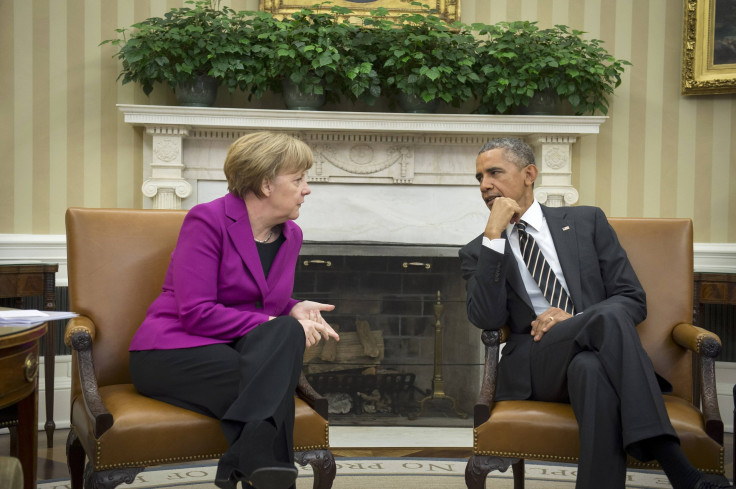Ukraine Crisis: Critical Week For Diplomacy As US, Europe Find Unity Elusive

Monday’s meeting between German Chancellor Angela Merkel and U.S. President Barack Obama marks the start of a critical week for Western countries trying to resolve the deteriorating crisis in eastern Ukraine. Deep uncertainty remains over whether Russia will accept a peace deal brokered by France and Germany and, if talks falter, whether the U.S. could move closer to sending arms to the Ukrainian government, which Europeans have opposed.
The meeting in Washington was a prelude to Wednesday’s high-stakes four-country summit in Minsk, Belarus, of Russia, Ukraine, France and Germany, to forge a peace deal with Russian President Vladimir Putin. It also comes as Obama faces increasing pressure in Washington to consider sending defensive weapons to the Ukrainians to counter the advancing Russian-backed separatists in the east.
Speaking at a joint White House press conference with Merkel Monday, Obama said the U.S. still had not decided whether to send arms to Kiev. “The possibility of lethal weapons is one of our options,” he said.
European leaders have generally dismissed the idea of sending weapons to Ukraine. But some in recent days have been making an effort to present a united front against speculation that the question may drive a wedge in the West’s strategy on the conflict. Obama reiterated this notion Monday. “Russian aggression has only reinforced the unity of the U.S. and Germany and our allies and partners around the world,” he said, although he admitted there might be “tactical disagreements” involved.
Last week’s emergency talks in Moscow among Putin, Merkel and French President François Hollande were officially described as “constructive,” according to various reports, though few details have come to light. But Merkel, speaking in Washington Monday, didn’t seem particularly upbeat about the prospects for a breakthrough. “There is anything but an assured success in this,” she said, but added it was necessary to make every effort to stop the bloodshed. Merkel has repeatedly stressed that there is no military solution to the eastern Ukraine conflict, but according to the Wall Street Journal, she reportedly told Putin she would not oppose the U.S. arming Ukraine if it chose to do so.
U.S. officials have also been skeptical of Russia’s moves in the wake of this week’s talks. “I’m not going to say it’s a positive sign that [Russia is] listening,” State Department spokesperson Marie Harf told the Associated Press Saturday. “They’ve been listening. They just haven’t been acting.”
Meanwhile, European Union leaders said Monday they would delay imposing additional sanctions on Russian and Ukrainian individuals and businesses in order to let the diplomatic process take its course. But EU officials also remained cautious about a potential agreement. “Until we see Russia complying on the ground – withdrawing troops, closing the border, stopping the flow of weapons – we can’t relieve the pressure in any way,” British Foreign Secretary Philip Hammond said during a meeting in Brussels with other EU leaders.
The Franco-German ceasefire deal at the heart of Wednesday’s talks reportedly reinforces conditions specified in the Minsk Agreement of September 2014. Its terms have been violated in recent months, and according to sources who spoke with the Wall Street Journal, the new plan would require Russian-backed separatists to withdraw from territory gained in recent months, while also prohibiting Ukrainian forces from occupying that land. According to the United Nations high commissioner for human rights, more than 5,350 people have died in the conflict since mid-April.
© Copyright IBTimes 2024. All rights reserved.






















